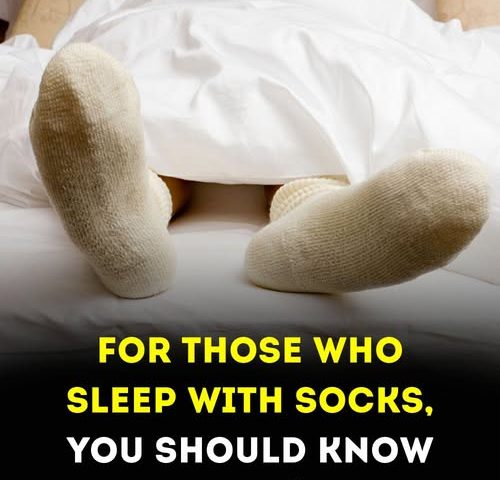For many people, slipping on a cozy pair of socks before bed is just a comfort ritual. However, did you know it can also have real health and sleep benefits?
Though sleeping with socks isn’t for everyone, it’s worth understanding how it can help — and who should skip the habit.
Why You Should Sleep in Socks

– Helps You Fall Asleep Faster
Warm feet boost vasodilation (blood vessel widening), which helps lower core body temperature — a signal to the brain that it’s time to sleep.
– Improves Overall Sleep Quality
Keeping a stable body temperature reduces nighttime waking and promotes deeper, more restful sleep.
– Prevents Cold Feet
Especially good for people who suffer from cold extremities or poor circulation.
– Supports Foot Skin Health
Wearing socks after moisturizing helps lock in moisture overnight, reducing dryness and cracked heels.
– May Reduce Hot Flashes and Nighttime Anxiety
Regulated temperature can help with hormonal symptoms or create a calming effect that eases restlessness.
Who Shouldn’t Sleep in Socks (or Needs to Be Cautious)

While sleeping in socks is generally safe, for some people, it could cause more harm than good.
Here’s who should avoid it or take extra precautions:
1. People with Diabetes or Poor Circulation
Socks that are too tight can restrict blood flow.
Those with neuropathy may not feel when socks are causing damage.
👉 Tip: If needed, wear non-binding diabetic socks designed for overnight use.
2. People Who Experience Night Sweats or Overheating
Extra warmth from socks can raise body temperature too much, causing sweating, discomfort, or disrupted sleep.
👉 Tip: Try warming your feet with a bath before bed instead of wearing socks all night.
3. Those Prone to Fungal Infections
Socks trap moisture and heat — the perfect environment for fungal growth like athlete’s foot or toenail fungus.
👉 Tip: Only wear clean, breathable socks made of cotton or moisture-wicking materials, and wash feet daily.
4. Infants and Small Children
Loose socks can be a choking hazard in babies’ cribs.
Toddlers may overheat or feel restricted by socks.
👉 Tip: Use footed sleepwear or warm sleep sacks instead of socks for babies.
5. People with Sensitive Skin or Allergies
Some synthetic materials can cause irritation, itching, or rashes.
👉 Tip: Choose organic cotton or hypoallergenic socks to avoid skin reactions.
6. Anyone Wearing Compression Socks Improperly
Compression socks are medical devices and shouldn’t be worn overnight unless advised by a doctor.
👉 Tip: Use regular loose sleep socks, not compression garments, for warmth.
Bottom Line
Sleeping in socks can help improve your sleep quality, comfort, and circulation — but only when done correctly.
Make sure to:
– Wear clean, breathable socks
– Avoid tight or synthetic materials
– Take extra care if you have circulatory, skin, or fungal conditions
When in doubt — and especially if you have a medical condition — consult your healthcare provider to ensure it’s safe for you.
